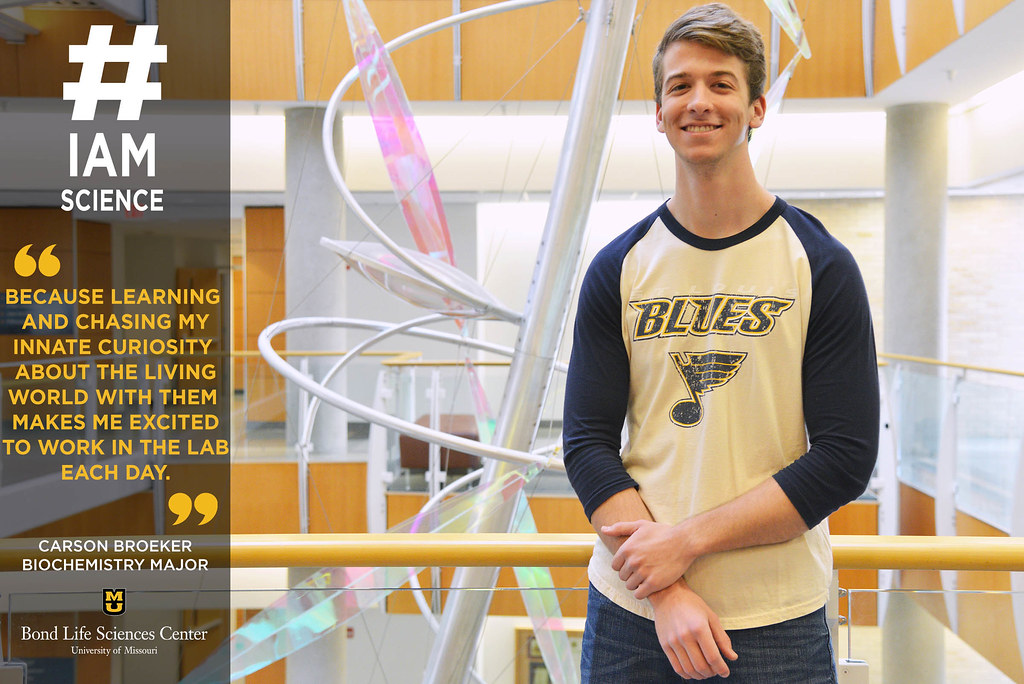
By Allison Scott | Bond LSC
“#IAmScience because learning and chasing my innate curiosity about the living world with them makes me excited to work in lab each day.”
Science can be about serendipity that leads to better discoveries and opportunities that researchers don’t expect. Carson Broeker knows this all too well.
“I wasn’t always interested in research,” said Broeker, a junior biochemistry major. “I took the three science classes my high school offered, but didn’t really get into the research side of things until I came to college.”
After speaking with his undergraduate research advisor his freshman year, Broeker began looking into which professors in Bond LSC were doing work he was interested in. From there, he contacted Ruthie Angelovici and was offered a position working in her lab during his sophomore year.
Now in his second year as part of the lab, he uses his biochemistry background to work with amino acids and uncover ways to increase nutritional benefits in seeds by analyzing their genes.
Candidate genes are selected through an observational method known as a genome wide association study (GWAS), where differences in the genetic sequences of a population are compared to their respective phenotypes. In this case, it is the amino acid levels in seeds. From there, Broeker can select a gene for further study via loss of function mutation, where the gene of interest is prevented from being expressed.
Broeker’s work has been on the model plant Arabidopsis thaliana, with hope that research performed is transferable to a staple crop species.
“My job is the precursor for engineered plants that will provide more food security,” Broeker said. “I confirm that each gene of interest has lost its function.”
If both alleles of the gene he studies have transfer DNA in them, they have supposedly lost their function. Once Broeker confirms genes that have done so, he can compare the amino acid levels from the mutant seeds to the normal wild type seeds.
“From that data, we can draw conclusions to see if the knockout of my gene of interest influenced certain amino acid levels,” Broeker said.
This information can then be used to engineer plants with sufficient nutrition to sustain a healthy human diet, which can have a great impact on the world’s food supply.
While his work with genes is the main way Broeker has been exposed to research, he is always learning from those he works alongside.
“I get to talk and work with others who either have the same or more knowledge about scientific topics than I do,” Broeker said. “Learning and chasing my innate curiosity about the living world with them makes me excited to work in lab each day.”
Next year as a senior, Broeker will join Chiswili Yves Chabu’s lab in Tucker Hall. Its focus is on developmental cell-to-cell communication and tumor progression and will allow Broeker to expand his knowledge in different areas of science, all while continuing to work in the Angelovici lab in Bond LSC.
“I’m excited to get more exposure to different types of research,” Broeker said. “Interdisciplinary aspects of research are strong right now, so joining the Chabu lab is a great way to be a part of that.”
While the added work will prove challenging, Broeker is excited about what his work in both labs will contribute to his graduate school applications, which he began working on this year.
“I’ve been studying for the GRE to prepare for applications,” Broeker said. “I worked in Angelovici’s lab last summer, but am in the process of applying for Research Experiences for Undergraduates programs for next summer.”
These programs, often referred to simply as REUs, allow students to better prepare for a graduate school path. They include workshops and seminars about various components of research, as well as GRE preparation classes.
“Under the guidance of mentors, I believe that pursuing an REU would be the best for me and my future in applying for graduate school,” Broeker said.
And while he’s excited about the opportunity to better understand research and continuing to find answers to the questions he has, Broeker is largely looking forward to life after earning his degrees.
“Trying to teach others about science is very important to me,” Broeker said. “I don’t want to go to graduate school just for more classes, I want expand our collective knowledge. Teaching people is just as important as doing the research. If you can’t teach, you won’t see any results from it.”

